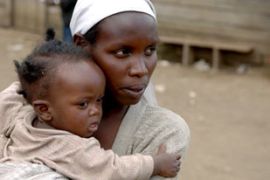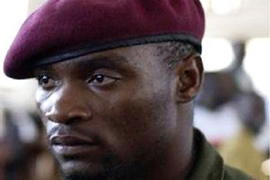Congo militia leader handed to ICC
Germain Katanga accused of masterminding massacre and rape of villagers.

Women and girls were raped and forced into sexual slavery while child fighters forcibly enlisted from the looted village, according to evidence presented to the court.
Witnesses have accused ethnic Lendu fighters in Katanga‘s militia of eating the still-warm hearts and livers of those killed.
Judges at the court issued a sealed warrant for Katanga’s arrest on July 2, saying there were “reasonable grounds to believe” the attack on Bogoro was part of a systematic campaign against members of the Hema ethnic group in Ituri carried out by Katanga’s militia and the armed Nationalist and Integrationist Front between January and March 2003.
“Katanga‘s name will forever be associated with the name of Bogoro: an ordinary village he had ordered fighters under his command to ‘wipe out’,” Bensouda said.
‘Significant step’
Human rights campaigners welcomed Katanga‘s transfer to the ICC.
“It’s a significant step forward that another individual has been transferred to The Hague,” Anneke Van Woudenberg, a Congo researcher with Human Rights Watch, said.
 |
| Witnesses say Katanga’s fighters ate the hearts and livers of those killed [AFP] |
Speaking from New York, she urged ICC prosecutors to investigate what she said were the “political masters” of Congolese military leaders who pillaged, raped and killed civilians in Ituri between 2002 and 2003.
Katanga was made a general in the Congolese army early in 2005 by Joseph Kabila, the president, as part of a power sharing deal with militia leaders that ended Congo’s devastating 1998-2002 civil war.
But he was arrested two months later in connection with the killing of nine UN peacekeepers in northeastern Congo in February 2005.
He is believed to have been in custody ever since, though he has never been tried for the slayings.
Katanga‘s ICC warrant was unsealed on Thursday, after Congolese authorities who had been detaining him turned him over and sent him to the Netherlands, where he was transferred to the ICC’s detention unit built inside a Dutch prison near the country’s North Sea coast.
The only other suspect in the cell block is Thomas Lubanga, head of a rival militia from the same region of Congo, whose trial on charges of recruiting and using child soldiers in Ituri is expected to start early next year.
Lubanga’s will be the first trial at the ICC, which was set up in 2002.
ICC prosecutor Luis Moreno-Ocampo said the court was investigating more brutal crimes in Congo.
“Today a second person from [Congo] is in custody, and he will not be the last one to face justice in the ICC,” he said. “Perpetrators must know they will be prosecuted.”
Enforcement challenges
But the fact that Katanga was already in Congolese custody before his arrest – as was Lubanga before him – highlights one of the ICC’s recurring problems: its inability to get its hands on suspects not being held by co-operative governments.
Warrants for senior government or militia leaders in Sudan and Uganda have not been enforced.
“The issue of arresting people remains a challenge for the ICC,” the court’s deputy prosecutor Fatou Bensouda said.
The court has no police force to execute arrest warrants and instead has to rely on co-operation from other states in detaining suspects.